Democratic debate night 2: Fact-checking the candidates on the issues
Ten candidates are participating in the second of two presidential debates.
Here's ABC News' fact check of the second of two Democratic presidential debates in Miami between former Vice President Joe Biden, Sen. Bernie Sanders, Sen. Kamala Harris, Mayor Pete Buttigieg, Sen. Michael Bennet, Sen. Kirsten Gillibrand, former Gov. John Hickenlooper, Rep. Eric Swalwell, author Marianne Williamson and entrepreneur Andrew Yang.
Our team of journalists from ABC News reviewed some of the 2020 candidates' statements on both nights of the debate in an effort to provide additional context, details and information.
FACT CHECK: Sanders defends his record on guns
Rachel Maddow: "A Vermont newspaper recently released portions of an interview you gave in 2013, in which you said, 'My own view on guns is, everything being equal, states should make those decisions.' Has your thinking changed since then, do you now think there's a federal role to play?"
Sanders: "Well that's a mischaracterization of my thinking."
Maddow: "It's a quote."
Sanders: "Look we have a gun crisis right now. Forty thousand people a year are getting killed. In 1988, Rachel, when it wasn't popular, I ran on a platform of banning assault weapons and -- in fact -- lost that race for Congress. I have a D-minus voting record from the (National Rifle Association) NRA. And I believe what we need is comprehensive gun legislation that, among other things, provides universal background. We end the gun-show loophole. We end the straw-man provision. And I believed in 1988 and I believe today, assault weapons, assault weapons are weapons are for the military and that they should not be on the streets of America."
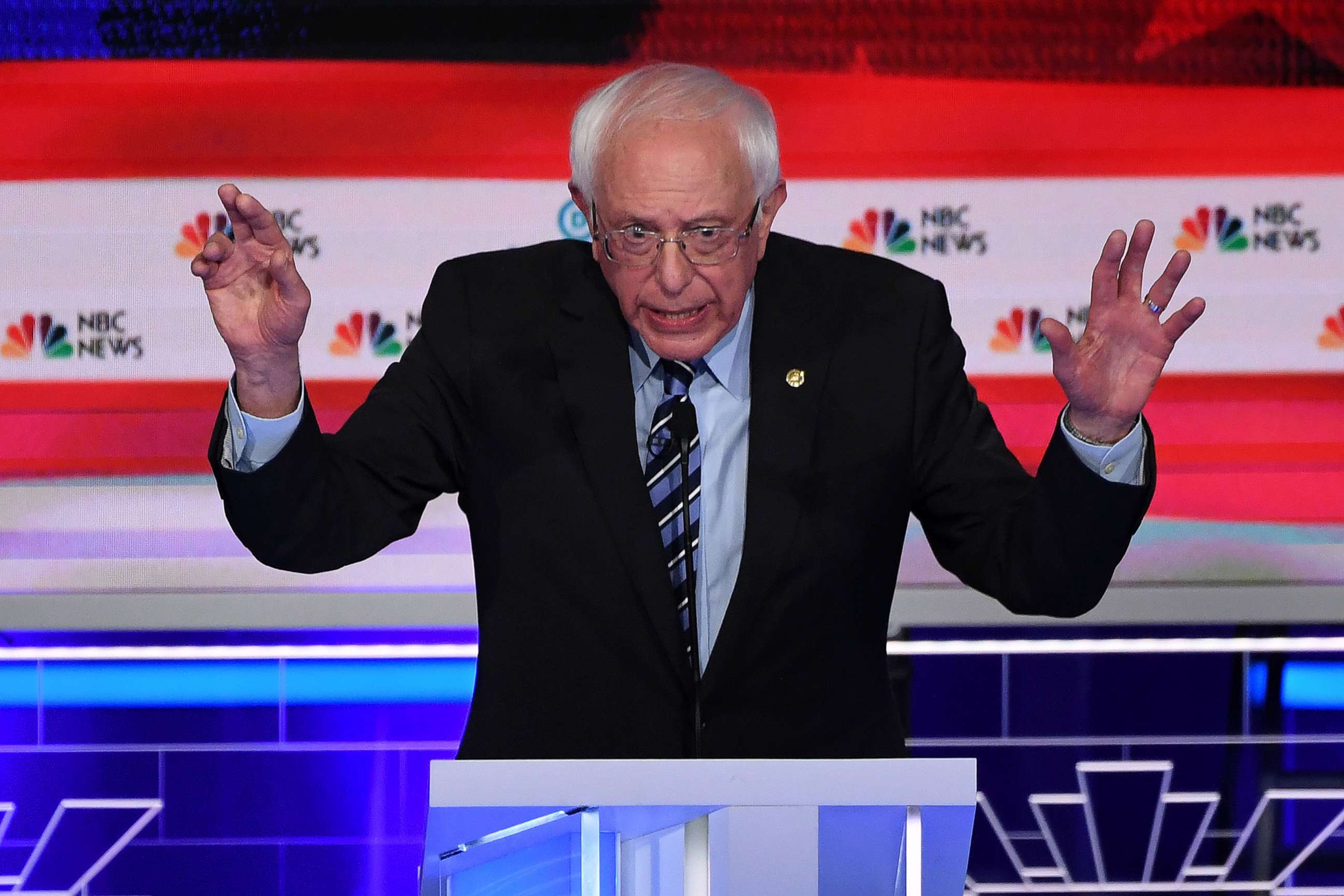
In defending his record on gun control, Sanders accused Maddow of mischaracterizing a quote that he gave to a Vermont paper in which he reportedly said, "My own view on guns is: Everything being equal, states should make those decisions."
Maddow quoted Sanders from a newly published interview he gave to Vermont's "Seven Days" paper in 2013.
Scrutiny of Sanders' past record on gun control issues is far from new, and was a frequent attack platform for Hillary Clinton in her battle against Sanders in the 2016 Democratic primary.
Sanders has been criticized by Democrats for voting against a 1993 national background check bill as well as his votes in 2003 and 2005 for bills that protected gun manufacturers from some lawsuits. Sanders did, however, vote in favor of the 1994 assault weapons ban.
Following the 2012 Sandy Hook Elementary school shooting, Sanders fell in line with most Democrats in supporting expanded background checks, as well as restrictions on high-capacity magazines.
Sanders is correct that his most recent voting rating from the NRA, issued back in 2012, was a D-minus. He previously received F grades between 1994-2002 and received a C-minus rating in 2006.
-Alexander Mallin
FACT CHECK: Biden and Sanders on Iraq
Biden: "The president turned to me and said, Joe, get our combat troops out of Iraq. I was responsible for getting 150,000 combat troops out of Iraq, and my son was one of them. I also think we should not have combat troops in Afghanistan."
Sanders: "One of the differences that Joe and I have in our record is Joe voted for that war, I helped lead the opposition to that war, which is a total disaster."
Biden and Sanders tussled over the 2002 vote by Congress to authorize President George W. Bush's invasion of Iraq, which Biden did vote in favor of and Sanders opposed. Biden later called his vote a mistake and eventually became a critic of the Bush administration's handling of the war.
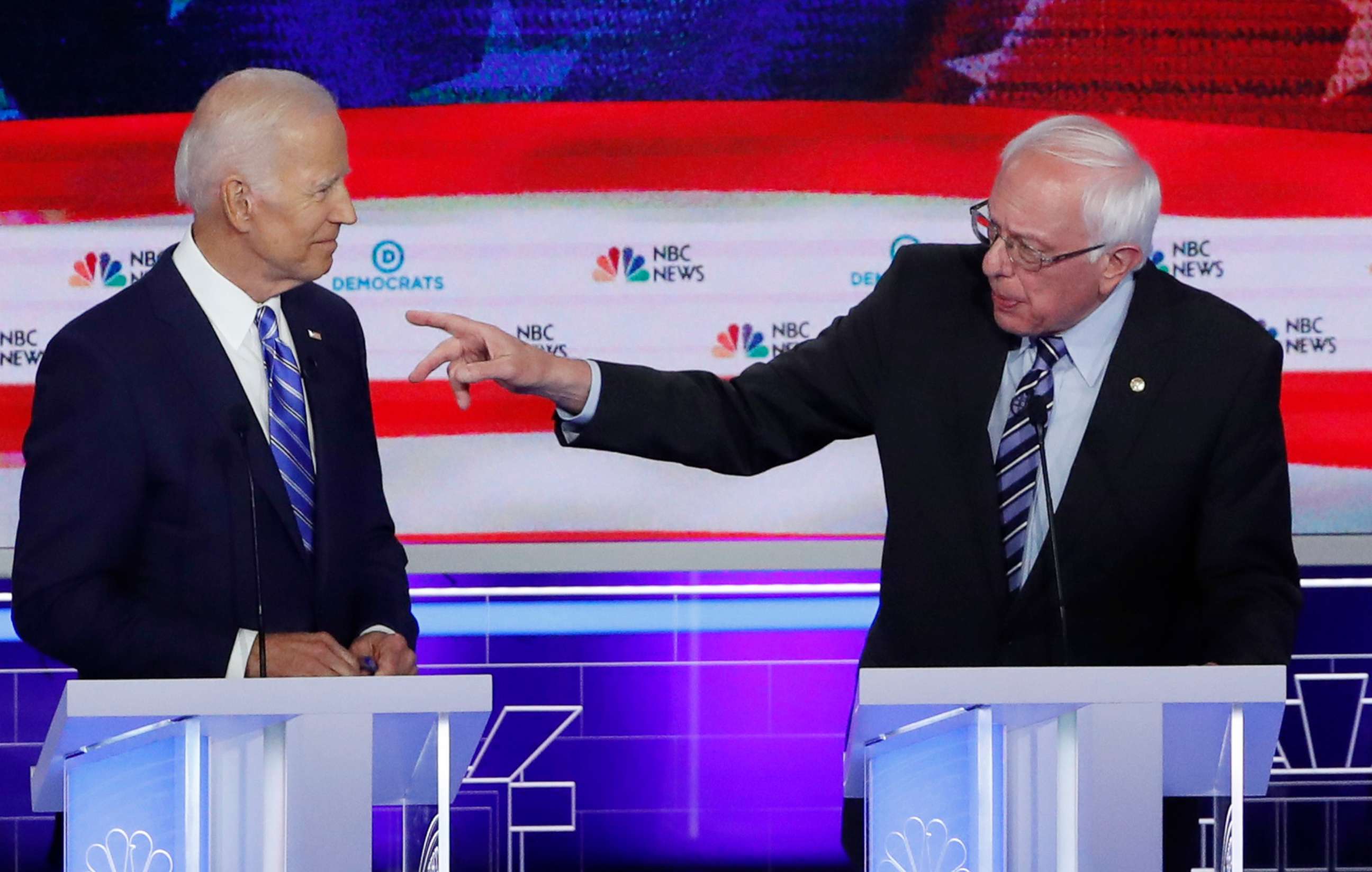
As vice president, Biden worked for another senator who opposed the Iraq War, President Barack Obama, who, consumed by the fallout of the 2008 financial crisis, made Biden the administration point person on Iraq. The Obama administration began that process, but the last combat troops -- numbering 150,000 at the administration’s start -- didn’t leave Iraq until December 2011.
In the aftermath of the U.S. withdrawal, sectarian violence in Iraq rose again and terror groups took hold in neighboring Syria amid the civil war there. Among those groups, the Islamic State emerged as the strongest, eventually taking a swath of territory in both countries the size of Britain. That forced the Obama administration to send troops back into Iraq, where they now number over 5,000, and are part of a global coalition of countries to fight ISIS, which numbered at least 67 when Biden left office.
While Biden says the U.S. should not have combat troops in Afghanistan, the Obama administration drew down American forces there, but did not completely withdraw.
-Conor Finnegan
FACT CHECK: Biden challenged on busing record
Biden: "I did not oppose busing in America. What I opposed is busing ordered by the Department of Education. That's what I opposed."
Biden's opposition to busing in the 1970's brought him together with southern segregationists in the Senate at the time, even as he dismissed their views and said he supported integration. It's a position that was consistent with other Democrats at the time, but has unsettled Democrats and progressives decades later.
In his earliest years as a young senator in the early 1970's, Biden spoke out against busing, arguing that the federal government shouldn't play a role in integrating schools.
"I oppose busing. It's an asinine concept, the utility of which has never been proven to me," he told a he told a Delaware weekly in 1975. "This is the real problem with busing -- you take people who aren't racist, people who are good citizens, who believe in equal education and opportunity, and you stunt their children's intellectual growth by busing them to an inferior school."
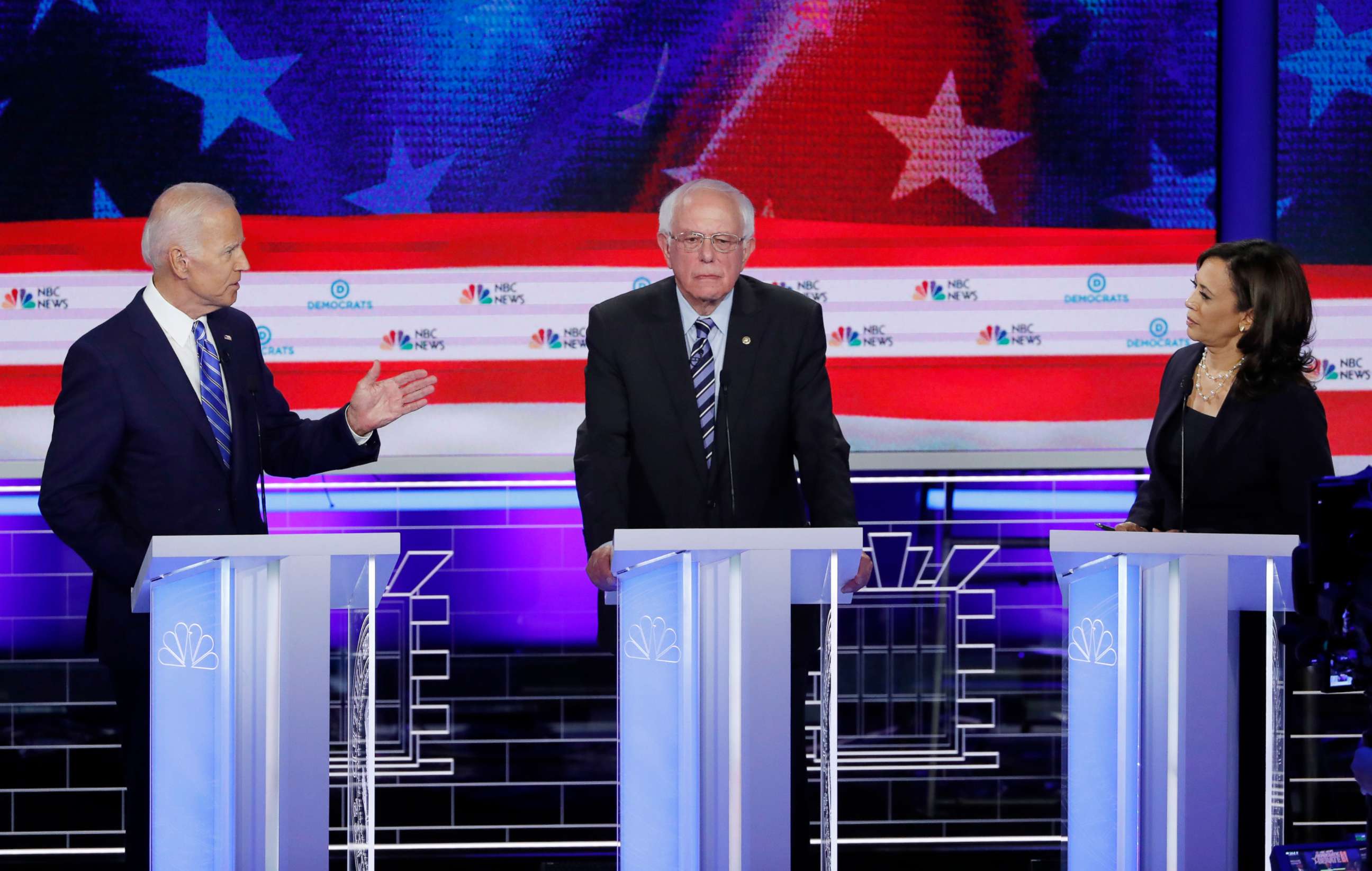
According to one historian of desegregation writing about the subject in Politico, Biden reflected concerns from some liberal suburban white families in Delaware and across the country who were concerned that integration would impact the quality public schools.
"It is true that the white man has suppressed the black man, and continues to suppress the black man. It is harder to be black than to be white," he said in 1975. "But you have to open up avenues for blacks without closing avenues for whites; you don't hold society back to let one segment catch up. You put more money into the black schools for remedial reading programs, you upgrade facilities, you upgrade opportunities, open up housing patterns. You give everybody a piece of the action."
-Benjamin Siegel
FACT CHECK: Hickenlooper on methane emissions
Hickenlooper: "We were the first state in America to bring the environmental community and the oil and gas industry to address, to aggressively address methane emissions."
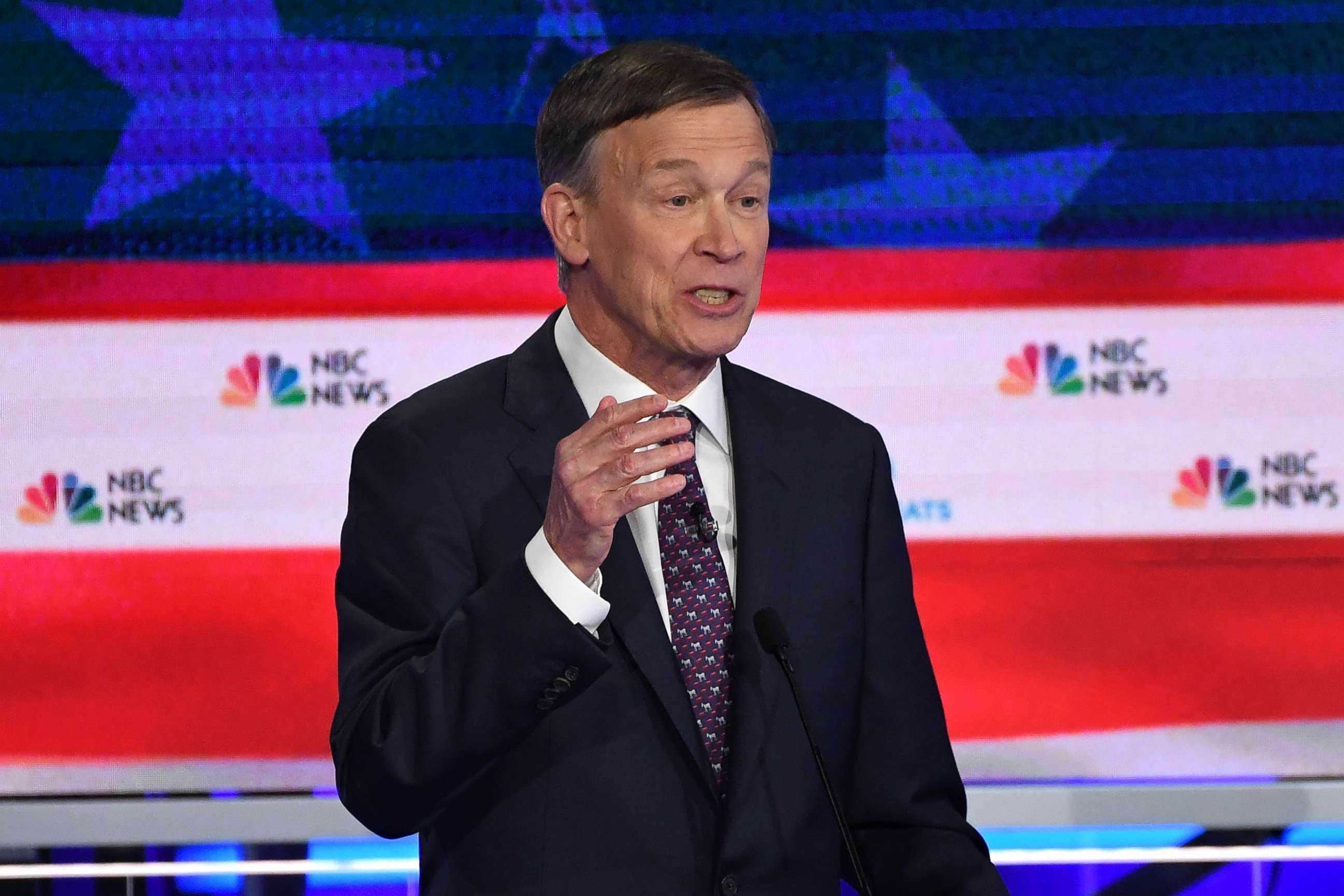
While Hickenlooper cites his track record on policies to reduce methane emissions that contribute to global warming, his background on energy policy is somewhat mixed as he's supported fracking and opposed measures that would have let cities regulate oil and gas facilities.
And, when he cites his background as a scientist -- it is as an oil industry geologist.
Hickenlooper has supported both policies to reduce greenhouse gas emissions in his home state of Colorado and opposed changes that would have made it easier for cities to regulate oil and gas facilities.
The contradiction is one of the key differences among the Democratic candidates on whether the country should work with the existing fossil fuel industry to reduce greenhouse gas emissions or push to eliminate fossil fuels completely in favor of renewable energy. Natural gas has grown exponentially in the U.S. because it's cheaper than sources like coal and the Energy Information Administration reports the amount of CO2 emissions from natural gas have surpassed other fossil fuels and are expected to continue to increase.
Hickenlooper and other candidates like former Rep. Beto O’Rourke that want to drastically reduce the release of carbon dioxide and other greenhouse gases without phasing out fossil fuels support ideas to encourage facilities that use fossil fuels to reduce emissions or technologies to actively remove carbon dioxide from the atmosphere, which are still considered relatively new and expensive.
-Sasha Pezenik and Stephanie Ebbs
FACT CHECK: Gillibrand on abortion rights under attack
Gillibrand: "Thirty states are trying to overturn Roe v. Wade right now."
There are arguments that Republican lawmakers have been introducing tight abortion bans knowing they will be challenged in courts, in the hopes that these cases will eventually get up to the Supreme Court and overturn Roe v. Wade. However, these bills do not explicitly overturn it. States cannot overturn a Supreme Court decision.
States have the right to set certain restrictions around abortion access after viability -- the point in a pregnancy when a fetus can survive outside the womb, which is a murky concept but generally accepted as after 20 weeks' gestation. State laws banning abortion before 20 weeks' gestation have been routinely struck down by courts as unconstitutional.
So far in 2019, at least 17 bans have been signed in at least 10 states -- but every type of ban is facing a legal challenge, and none of the laws have been enacted. In addition, while the passage of so-called "heartbeat" bans have received much attention, none of those laws are currently in effect.
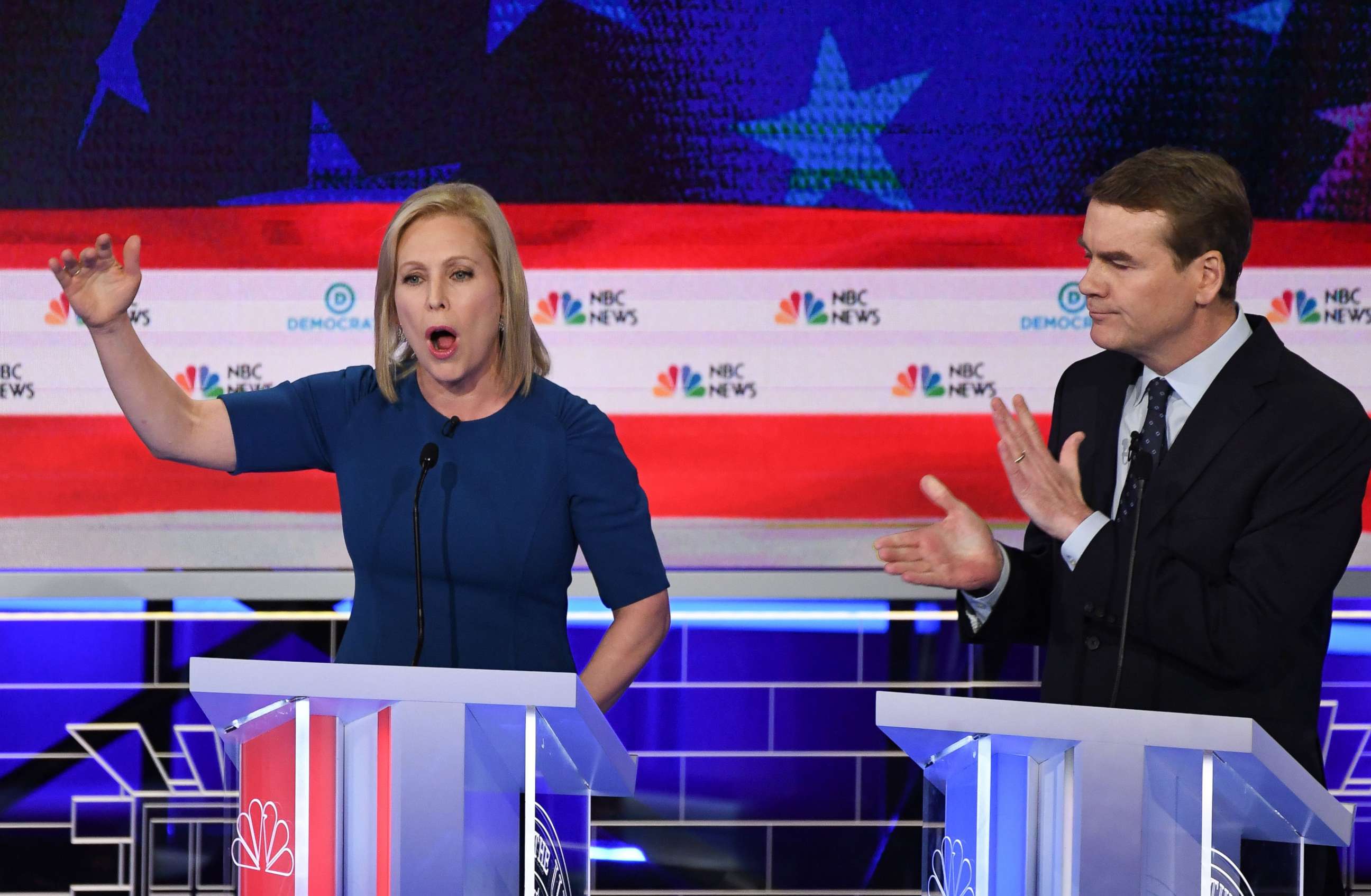
Still, several states have been enacting so-called "trigger" laws, which would immediately make abortion illegal in that state should Roe be overturned. However, it is not near 30 states. Seven states, according to the Guttmacher Institute, a reproductive rights research organization, have "trigger" laws to make abortion illegal in the state should Roe be overturned. In total, per the Guttmacher Institute, 19 states have laws on the books that could restrict abortion rights, should Roe be overturned, including laws that are currently blocked by courts.
Gillibrand may have been referring to a 2004 report from the Center for Reproductive Rights, which stated, "In 30 states, women are at risk of losing their right to choose abortion after a reversal of Roe; 21 of these states warrant the highest level of concern."
Again, however, those laws do not overturn Roe, they just come into effect should Roe be overturned.
On the other hand, meanwhile, there are also states working on "trigger" laws that would maintain the right to abortion in that state should Roe be overturned. That includes 10 states, per the Guttmacher Institute. In 2019 alone, Rhode Island, Illinois, Vermont and New York signed such laws, while other states passed other measures that increased abortion access.
-Alexandra Svokos
FACT CHECK: Harris' immigration record as California AG
Harris: "They should not be deported. And I -- actually -- this was one of the very few issues with which I disagreed with the [Obama] administration with whom I always had a great relationship with and a great deal of respect ... and on this issue, I disagreed with my president. Because policy was to allow deportation of people who by ICE's own definition were non-criminals. So as attorney general and the chief law officer of the state of California, I issued a directive to the sheriffs of my state that they did not have to comply with detainers and instead should make decisions based on the best interest of public safety of their community."
In announcing her support for reversing U.S. policy and decriminalizing the act of illegally crossing the southern border, Harris provided the example of her past opposition to the Obama administration's 'Secure Communities' program while she was California's Attorney General.
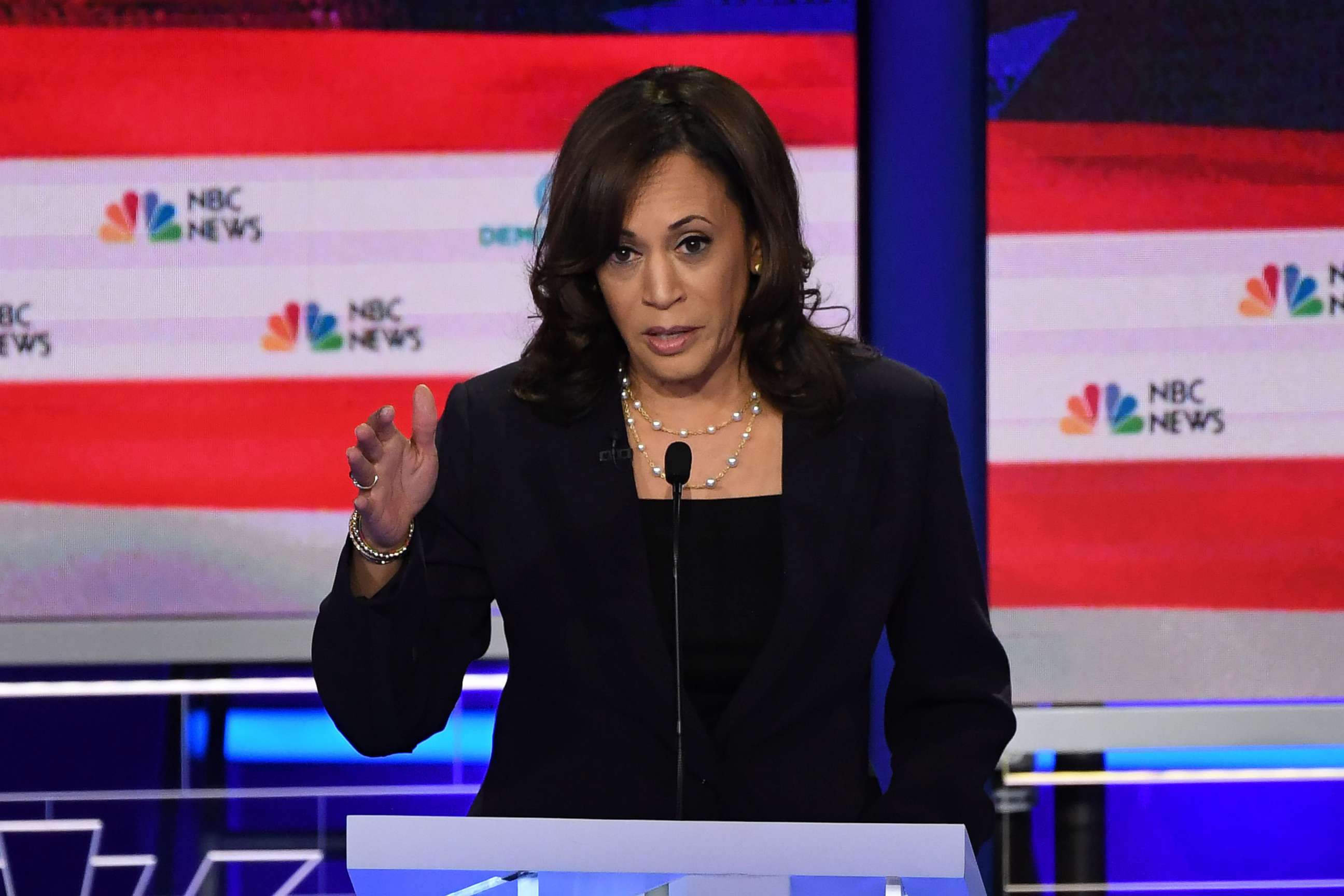
Harris did indeed make headlines in December 2012 when she told local law enforcement across the state that they could choose whether or not to comply with federal detainer requests for undocumented immigrants.
However, Harris also was criticized at the time by some immigrant rights groups for not going further and issuing a statewide rule on the issue. Harris was also reported at the time to have opposed a bill that would have "forbidden police departments to honor federal detainer requests except in cases in which defendants had been convicted of a serious or violent crime."
-Alexander Mallin
FACT CHECK: Buttigieg: Americans pay $800 more each year due to Trump tariffs
Buttigieg: "Tariffs are taxes and Americans pay $800 more a year because of the tariffs. Meanwhile, China is investing so they could soon be able to run circles around us in artificial intelligence."
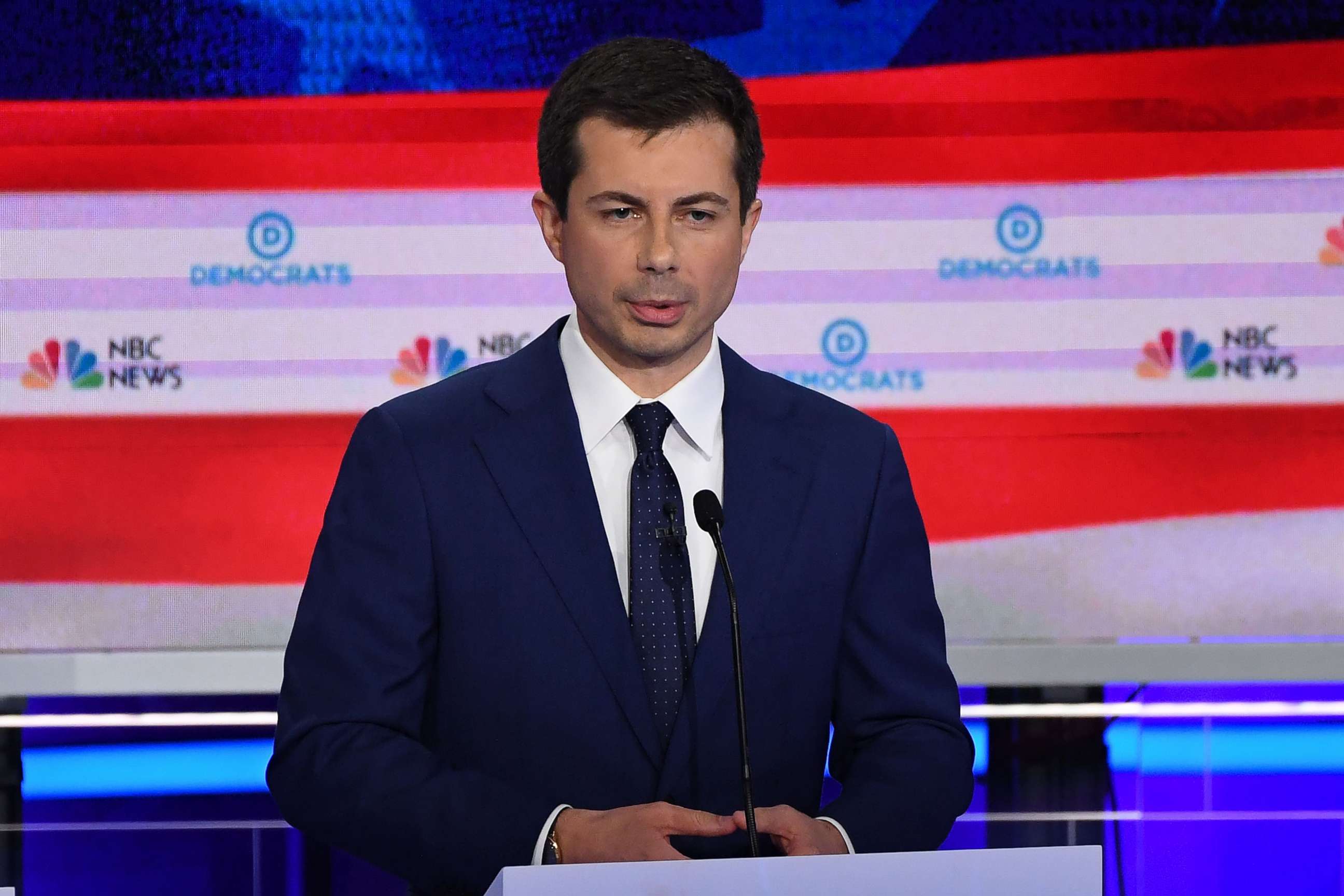
Economists believe that tariffs on imported goods are indeed taxes, that either business or consumers end up paying. Most economists also say the costs associated with tariffs are eventually passed on to consumers. Businesses do this by raising the cost of the impacted good, which means consumers pay more in the end.
Buttigieg is likely citing a report from the Federal Reserve Bank of New York which says that increased U.S. tariffs would cost Americans roughly $831 a year, a claim he’s repeated to ABC's "This Week" Co-Anchor Martha Raddatz in a May interview.
-Matthew Vann
FACT CHECK: Gillibrand claims seven children have died in custody during the Trump administration
Sen. Gillibrand: "One of the worst things about President Trump, what he has done to the country is torn apart the moral fabric of who we are. When we started separating children at the border from their parents, the fact that seven children have died in his custody, the fact that dozens of children have been separated from their parents and have no plan to reunite them, I would do a few things."
It is correct that seven children have died after having been recently in U.S. custody. Most of them died after experiencing flu-like symptoms and being held at centers that immigration advocates have said were too crowded. One of those children, however, died from a congenital heart defect and her death was not tied to her care.
-Anne Flaherty
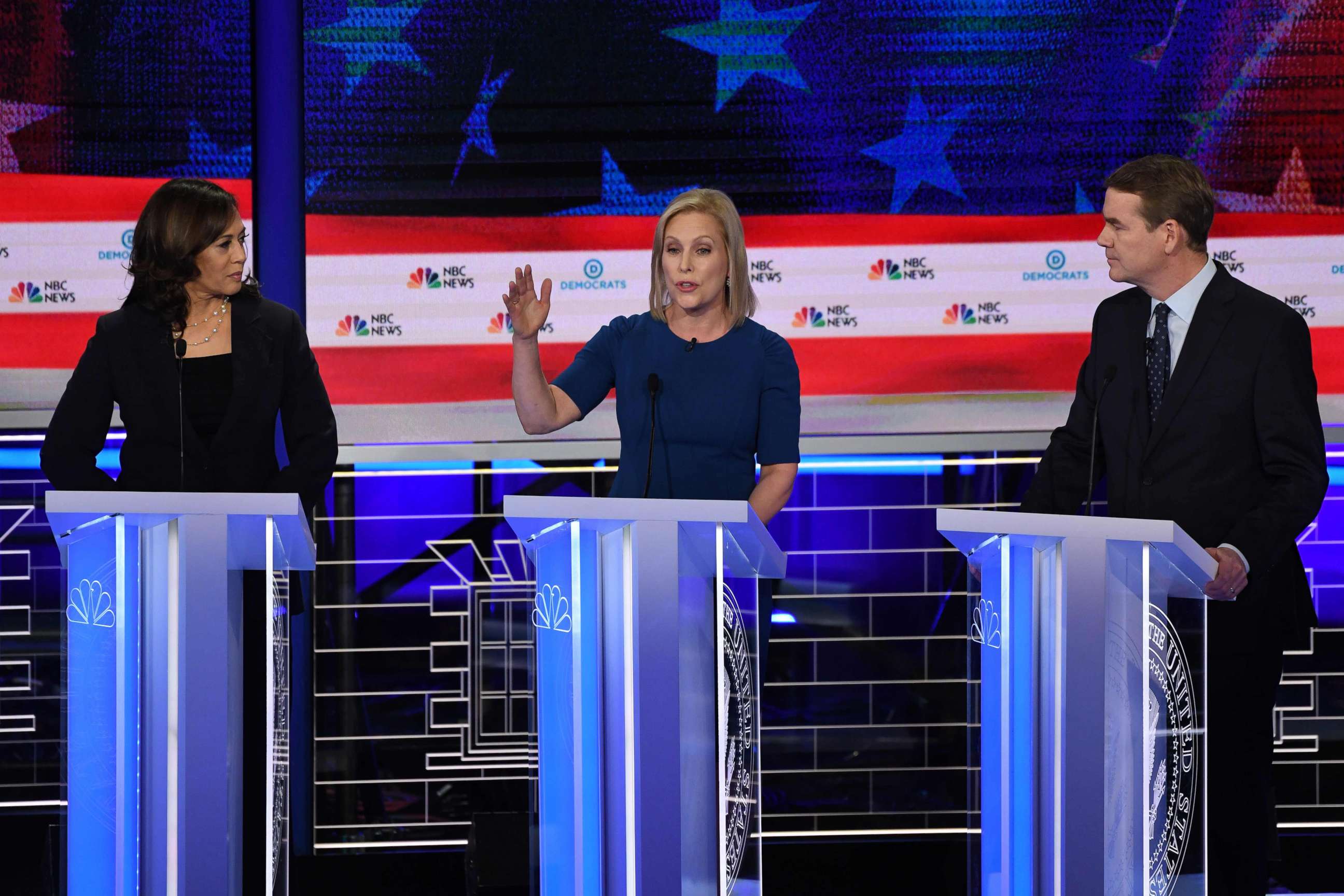
FACT CHECK: Sanders on the U.S. paying highest prices in the world for prescription drugs
Sanders: "The function of the health care system today is to make billions in profits for the insurance companies and last year -- if you can believe it -- while we pay the highest prices in the world for prescription drugs and I will lower prices in half in this country top 10 companies made $69 billion in profit."
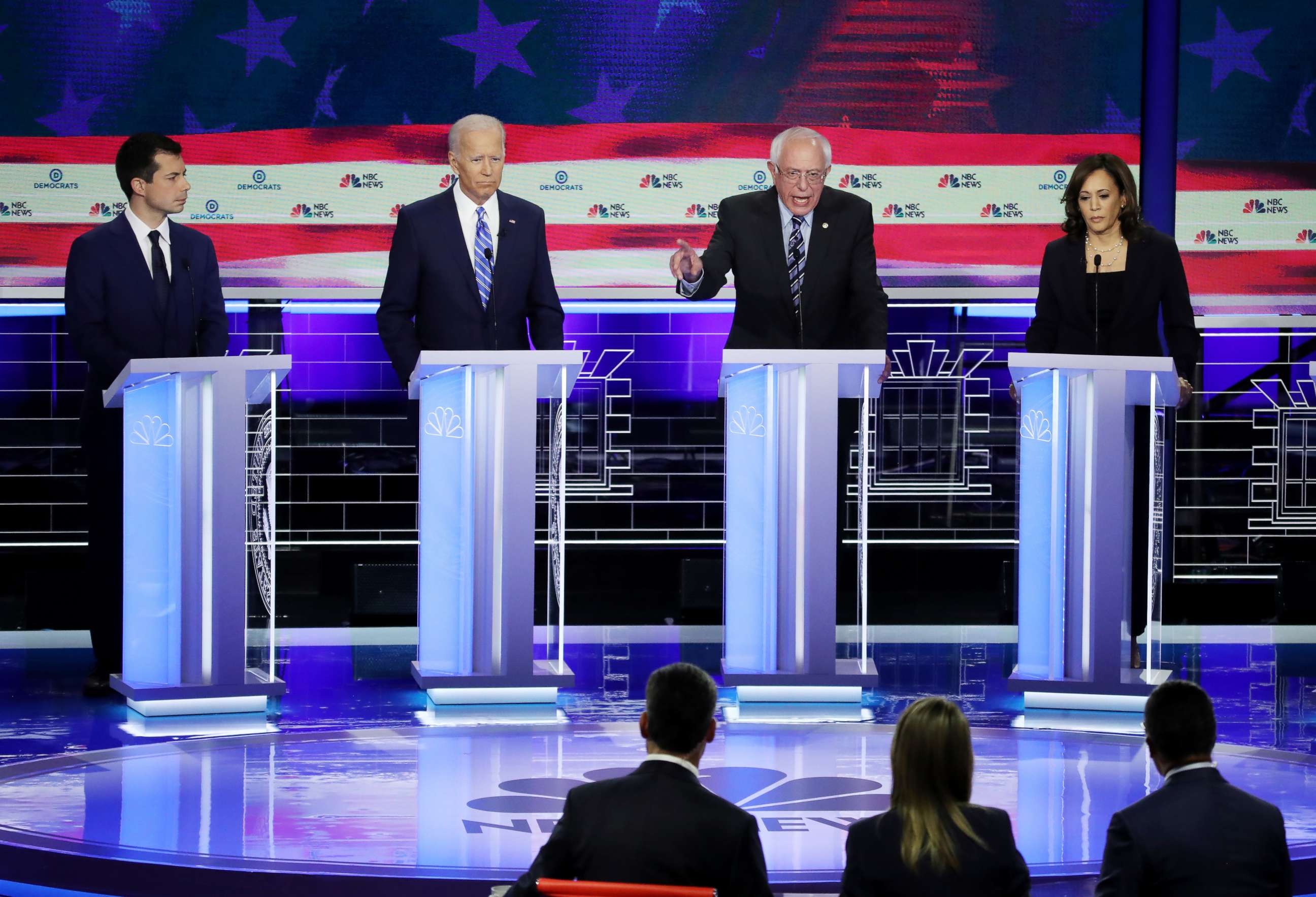
Sanders said on Thursday night that the United States pays the "highest prices in the world for prescription drugs," which is generally true. When Health and Human Services looked at the costs of drugs mostly covered by Medicare, HHS Secretary Alex Azar said the agency found that Medicare paid the highest price for 19 out of 27 drugs compared to other developed countries, ABC News previously reported.
Additionally, a study in the Journal of the American Medical Association found that in 2016, "the United States spent nearly twice as much as 10 high-income countries on medical care and performed less well on many population health outcomes."
Why is this? ABC News previously reported that drug companies say individuals in the United States generally get access to these drugs first and the money goes to research that often benefit American consumers.
-Anne Flaherty and Sophie Tatum
FACT CHECK: Buttigieg on support for pathway to legal immigration
Buttigieg: "The American people want a pathway to citizenship, they want protections for Dreamers."
Buttigieg is correct that a majority of Americans want to find a way for the 10.5 undocumented immigrants already living and working in the U.S. to become legal.
A 2019 Gallup poll found that 81% support a path to citizenship for immigrants in the U.S. illegally. A separate 2015 Associated Press-GfK poll, found the majority of Americans -- 54% -- support a way for immigrants who are already in the country illegally to become citizens. That poll says 44% are opposed.
In a 2017 poll by AP and the NORC Center for Public Affairs Research, just 1 in 5 Americans said they wanted to deport young immigrants brought to the U.S. as children and are in the country illegally. Those young immigrants are often referred to as "Dreamers."
-Anne Flaherty
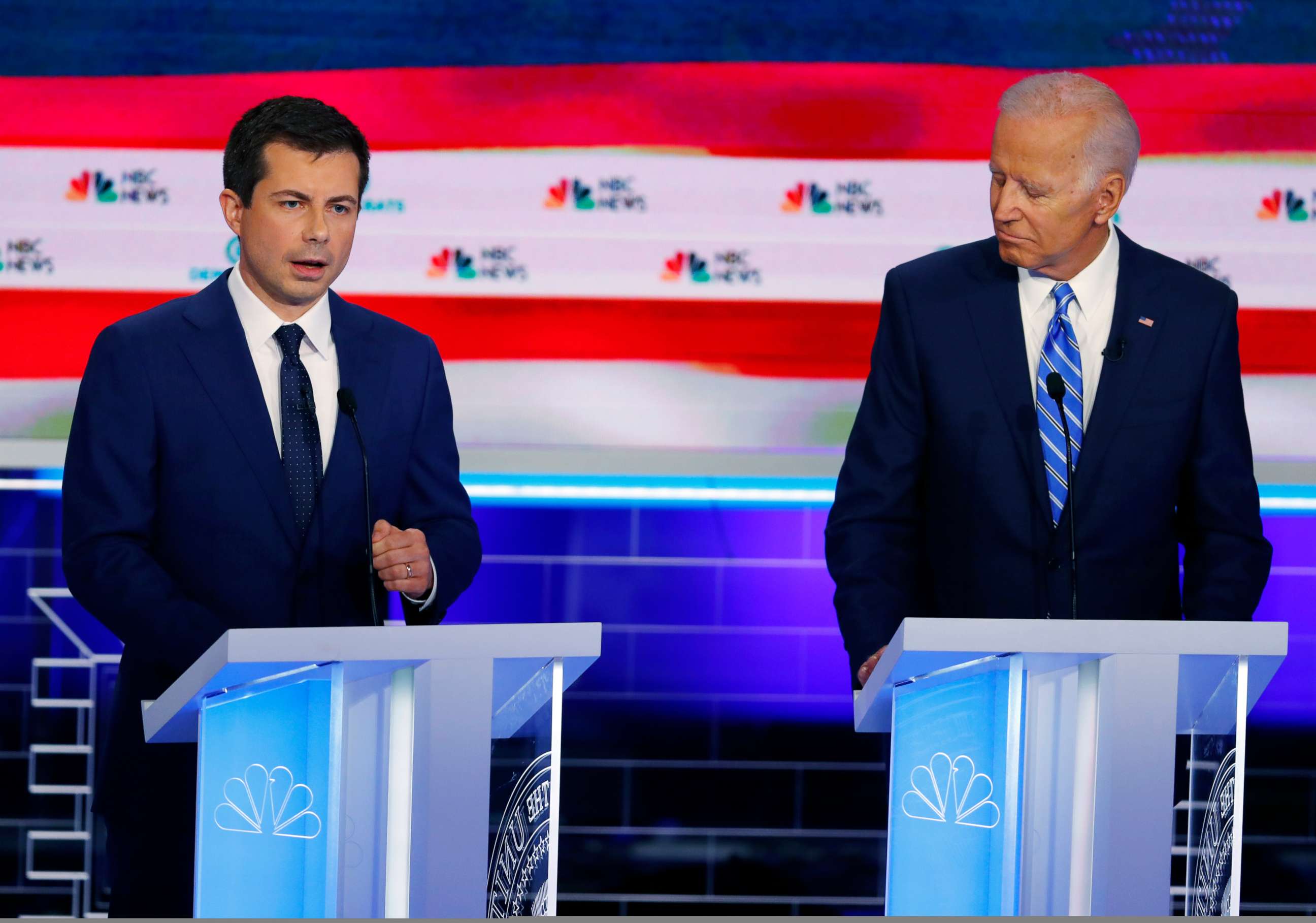
FACT CHECK: Yang on automation taking away jobs
Yang: "This is the move that we have to make, particularly as technology is now automating away millions of American jobs, it’s why Donald Trump is our president today. That we automated away four million manufacturing jobs in Michigan, Ohio, Pennsylvania and Wisconsin and we are about to do the same to millions of retail jobs, call center jobs, fast food, truck driver jobs and on and on through the economy."
Yang's platform line on automating jobs has merit.
From 2000 to 2010, the U.S. lost 5.6 million manufacturing jobs, according to a study by the Center for Business and Economic Research at Ball State University, as cited by the Financial Times in 2016. Of that 5.6 million, 85% -- 4.76 million -- were lost due to technological trade, including largely automation.
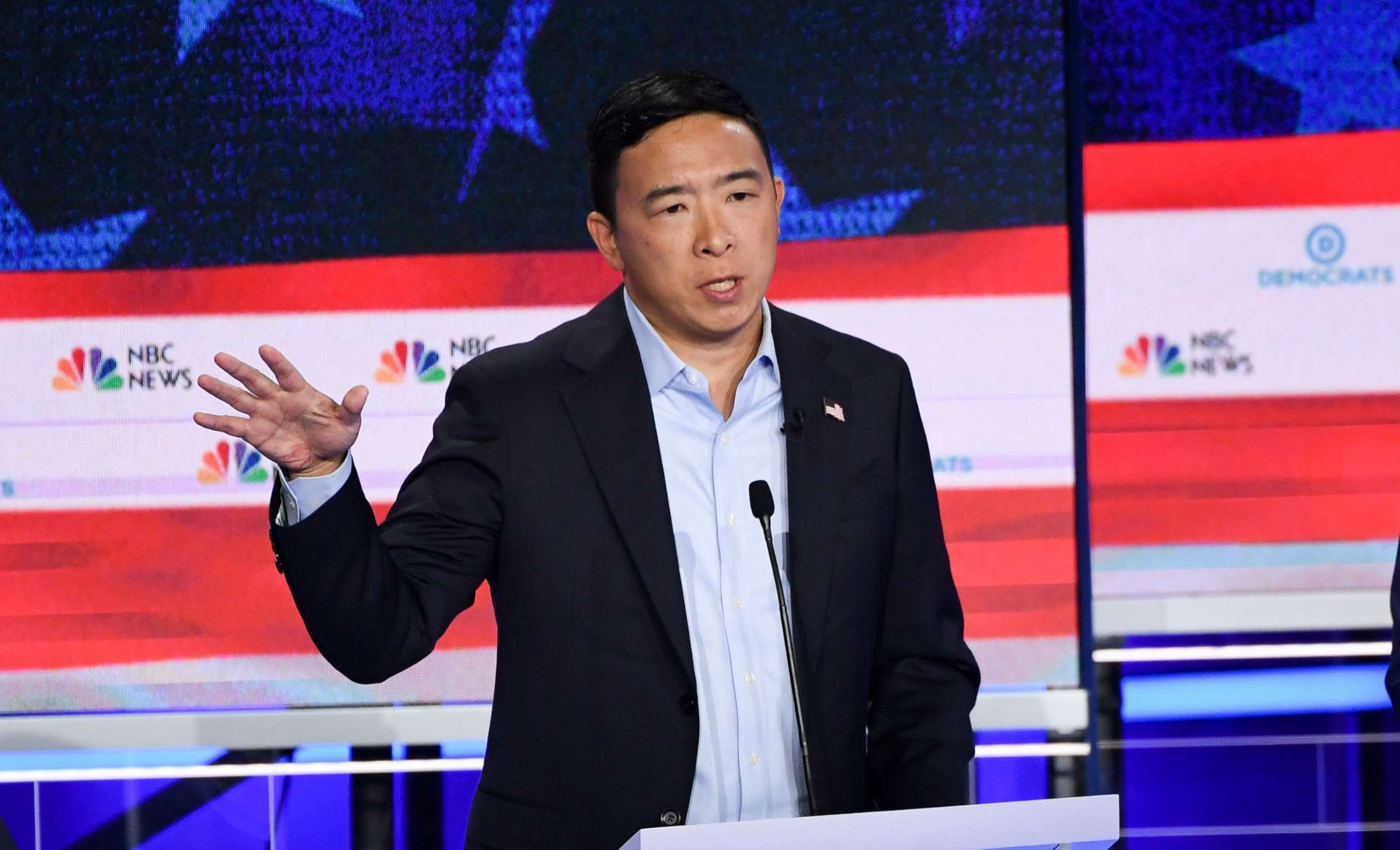
A 2019 Brookings Institution study said that Midwestern states would be hardest hit by automation, and a 2017 Brookings study found that industrial robots are highly populated around the Midwestern states, which could correlate with a loss of manufacturing jobs.
In his campaign speeches, Yang has referenced reports from MIT, McKinsey & Company and Bain & Company about the future of manufacturing jobs. An Oxford Economics report released this week claimed that 20 million manufacturing jobs would be displaced by machines by 2030 worldwide. A 2017 McKinsey study found that 75 million to 375 million people worldwide may need to change jobs and get new skills by 2030.
However, while studies show jobs will be lost do automation, they also point towards job growth. A 2018 World Economic Forum report found that while 75 million jobs may be lost in the shift to automation, 133 million more jobs may emerge.
- Alexandra Svokos
FACT CHECK: Sanders says 83% of Trump tax benefits go to the top 1%
Sanders: "Well, President Trump, you are not standing up for working families when you try to throw 32 million people off their health care that they have and that 83% of your tax benefits go to the top 1%."
Analysis from the left-leaning Tax Policy Center found that the top 1% of Americans would receive 82.8% of President Donald Trump's tax benefits. The study also finds that under the first few years of the bill, benefits of the law are still aimed towards upper-middle and upper class Americans.
All income groups under the tax plan immediately see some sort of tax cut, but the biggest cuts are reserved for the ultra-wealthy. More than half of American households, however, would eventually see a tax increase, according to the report by 2027.
-Matthew Vann
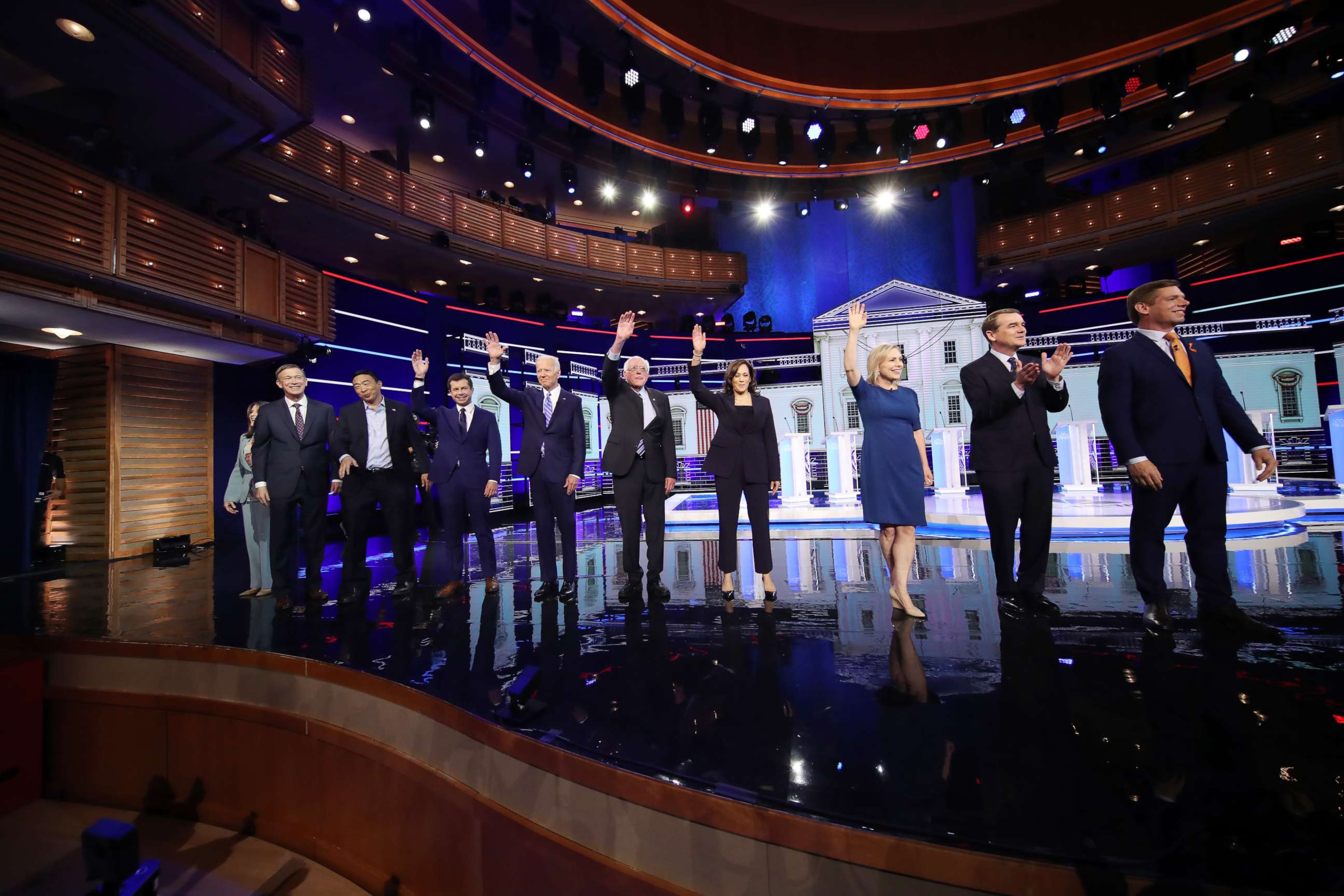
FACT CHECK: Sanders on wealthiest three Americans vs the bottom 50% of Americans
Sanders: "We have a new vision for America and at a time when we have three people in this country owning more wealth than the bottom half of America, while 500,000 people are sleeping out on the streets today, we think it is time for change, real change."
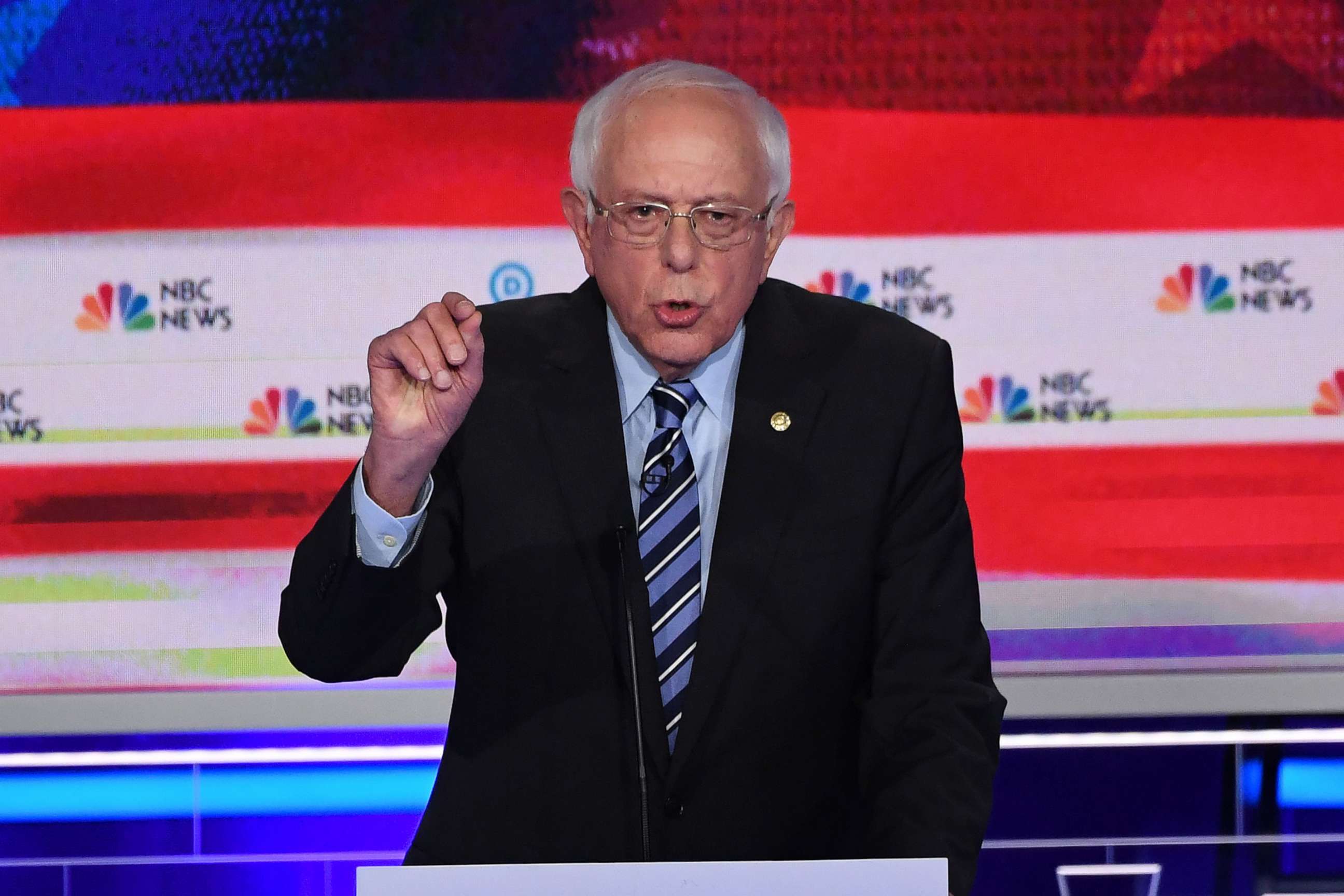
Sanders is likely citing a 2018 Forbes estimate of the three wealthiest individuals in the U.S. Jeff Bezos, Bill Gates and Warren Buffett had a combined net worth of $330 billion. According to Forbes, Bezos and his family have approximately $160 billion, Gates has $97 billion and Buffett had an estimated net worth of $88.3 billion.
The 2016 Federal Reserve Survey of Consumer Finances estimated that the bottom 50% of Americans held a combined net worth of $245 billion.
A 2015 study from the U.S. Department of Housing and Urban development reported 500,000 people were homeless during the year 2015.
-Adam Kelsey




